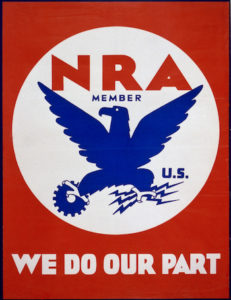
On this date in 1933, the National Industrial Recovery Act (NIRA) was passed into law.
It was a US labor and consumer law passed by the US Congress to authorize the President to regulate the industry for fair wages and prices, thereby stimulating economic recovery. It also established a national public works program known as the Public Works Administration (PWA), which should not be confused with the Works Progress Administration (WPA) of 1935. The National Recovery Administration (NRA) portion was widely hailed in 1933, but in 1934, businesses' opinion of the act had soured. By March 1934, the NRA was engaged chiefly in drawing up these industrial codes for all industries to adopt."
However, the Supreme Court declared the NIRA unconstitutional in 1935, and it was not replaced. The legislation was enacted during the Great Depression in the United States as part of President Franklin D. Roosevelt's New Deal legislative program. Section 7(a) of the bill, which protected collective bargaining rights for unions, proved contentious (especially in the Senate), but both chambers eventually passed the legislation. President Roosevelt signed the bill into law.
The Act had two main sections (or "titles"). Title I was devoted to industrial recovery, authorizing the promulgation of industrial codes of fair competition, guaranteeing trade union rights, permitting the regulation of working standards, and regulating the price of certain refined petroleum products and their transportation. Title II established the Public Works Administration and outlined the projects and funding opportunities it could engage in. Title II also provided funding for the Act. It authorized the president to issue executive orders establishing some 700 industrial cartels, restricting output, and forcing wages and prices above market levels. The minimum wage regulations made it illegal for employers to hire people who weren’t worth the minimum wage because they lacked skills.
As a result, some 500,000 Blacks, particularly in the South, were estimated to have lost their jobs. The National Industrial Recovery Act is widely considered a policy failure, both in the 1930s and by historians today. Disputes over the reasons for this failure continue. Among the suggested causes are that the Act promoted economically harmful monopolies, that the Act lacked critical support from the business community, and that it was poorly administered. The Act encouraged union organizing, which led to significant labor unrest. The NIRA had no mechanisms for handling these problems, which led Congress to pass the National Labor Relations Act in 1935. The Act was also a major force behind a major modification of the law, criminalizing the making of false statements.